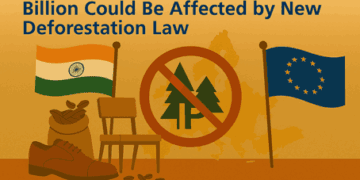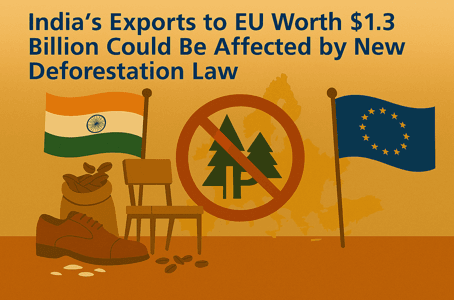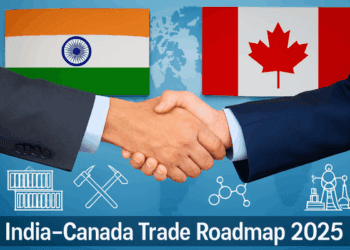Indias Exports to EU
The European Union’s new Deforestation Regulation (EUDR) has raised alarms across India’s export sector, with nearly $1.3 billion worth of goods—ranging from leather and coffee to wooden furniture—potentially facing compliance hurdles. The regulation, aimed at curbing global deforestation, mandates strict traceability and sustainability standards for commodities entering the EU market. While the law’s implementation has been delayed until December 2025, exporters are racing against time to adapt.
Understanding the EU Deforestation Regulation
Passed in 2023, the EUDR requires companies to prove that their products do not contribute to deforestation—legal or illegal. It applies to seven key commodities: cattle, cocoa, coffee, palm oil, soy, timber, and rubber, along with derived products like leather, chocolate, and furniture. The regulation is part of the EU’s broader climate agenda under the European Green Deal.
Key Requirements
- Due diligence statements for all covered products
- Geolocation data for origin of raw materials
- Proof of deforestation-free sourcing
- Penalties for non-compliance, including fines and import bans
India’s Export Exposure
India exports over $1.3 billion worth of affected goods to the EU annually. Leather, coffee, and wooden furniture are among the most vulnerable categories. These sectors rely heavily on small and medium enterprises (SMEs), which may struggle to meet the new documentation and traceability standards.
| Commodity | Annual Export Value to EU (USD) | Risk Level |
|---|---|---|
| Leather & Footwear | $520 million | High |
| Coffee | $310 million | Moderate |
| Wooden Furniture | $210 million | High |
| Rubber Products | $140 million | Moderate |
| Others (Cocoa, Palm Oil) | $120 million | Low |
Industry Reactions
Indian exporters and trade associations have expressed concern over the regulation’s complexity and cost implications. Many SMEs lack the digital infrastructure to provide geolocation data or conduct supply chain audits.
Stakeholder Quotes
- “This law could disrupt our EU business unless we get support for compliance.” – Ramesh Jain, leather exporter
- “We need clarity and technical assistance to meet traceability norms.” – Coffee Board of India
- “The delay is welcome, but we must act fast.” – Federation of Indian Export Organisations (FIEO)
EU’s Temporary Relief
In response to pushback from India and other trading partners, the EU has proposed delaying the enforcement of EUDR by one year—from December 2024 to December 2025. This extension offers exporters more time to prepare, but the compliance deadline remains firm.
Implications of the Delay
- Additional time for exporters to upgrade systems
- Opportunity for government-led training and support
- Reduced risk of immediate trade disruption
Government Response
The Indian government is engaging with EU counterparts to seek flexibility and technical cooperation. The Ministry of Commerce is also working on a national traceability framework to help exporters meet EUDR requirements.
Policy Measures Underway
- Digital traceability pilot for leather and coffee sectors
- Workshops and webinars for exporters
- Collaboration with EU agencies for compliance tools
- Exploration of bilateral sustainability certification
Strategic Risks and Opportunities
While the regulation poses short-term challenges, it also offers long-term opportunities for Indian exporters to align with global sustainability standards. Compliance could enhance brand value, open new markets, and attract ESG-conscious buyers.
Risks
- Loss of market access for non-compliant exporters
- Increased cost of compliance and audits
- Reputational damage from failed shipments
Opportunities
- Premium pricing for certified sustainable products
- Access to EU green financing and grants
- Strengthened supply chain transparency
Conclusion
The EU’s deforestation law is a wake-up call for India’s export ecosystem. With $1.3 billion in trade at stake, proactive adaptation is essential. The delay in enforcement offers breathing room, but the clock is ticking. Exporters, policymakers, and industry bodies must collaborate to ensure India’s exports remain competitive, compliant, and climate-conscious.
Postscript: What to Watch Next
Key developments to monitor include final EU implementation guidelines, India’s national traceability rollout, and sector-specific compliance pilots. The next six months will be critical in shaping India’s response to one of the most impactful trade regulations of the decade.




















